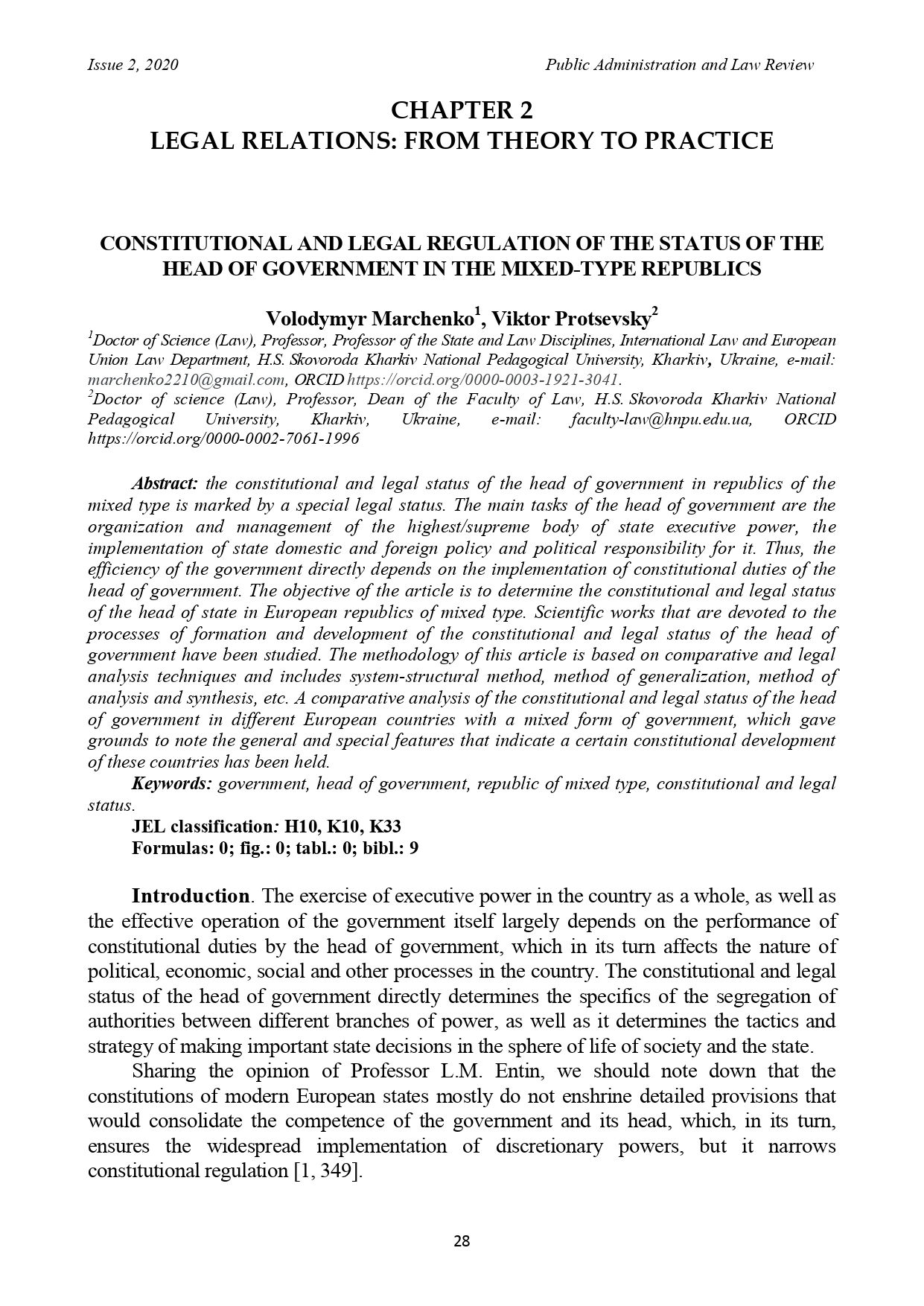CONSTITUTIONAL AND LEGAL REGULATION OF THE STATUS OF THE HEAD OF GOVERNMENT IN THE MIXED-TYPE REPUBLICS
DOI:
https://doi.org/10.36690/2674-5216-2020-2-28Keywords:
government, head of government, republic of mixed type, constitutional and legal statusAbstract
The constitutional and legal status of the head of government in republics of the mixed type is marked by a special legal status. The main tasks of the head of government are the organization and management of the highest/supreme body of state executive power, the implementation of state domestic and foreign policy and political responsibility for it. Thus, the efficiency of the government directly depends on the implementation of constitutional duties of the head of government. The objective of the article is to determine the constitutional and legal status of the head of state in European republics of mixed type. Scientific works that are devoted to the processes of formation and development of the constitutional and legal status of the head of government have been studied. The methodology of this article is based on comparative and legal analysis techniques and includes system-structural method, method of generalization, method of analysis and synthesis, etc. A comparative analysis of the constitutional and legal status of the head of government in different European countries with a mixed form of government, which gave grounds to note the general and special features that indicate a certain constitutional development of these countries has been held.
Downloads
References
Constitutional law of foreign countries (2005). 1056 p.
The Constitution of Ukraine. Retrieved from: https://zakon.rada.gov.ua/laws/show/254%D0%BA/96-%D0%B2%D1%80#Text.
Law of Ukraine "On the Cabinet of Ministers of Ukraine". Retrieved from : https://zakon.rada.gov.ua/laws/show/794-18#Text.
Decision of the Constitutional Court of Ukraine № 16рп / 2008 of 17.09.2008 in the case on the constitutional petition of 105 people's deputies of Ukraine concerning the official interpretation of the provisions of parts six, seven, nine of Article 83 of the Constitution of Ukraine (case on a coalition of parliamentary factions in the Verkhovna Rada of Ukraine). Retrieved from : https://zakon.rada.gov.ua/laws/show/v016p710-08#Text (access date 10.07.2020).
The Constitution of the Russian Federation. Retrieved from : http://www.constitution.ru/ (access date 30.06.2020).
Resolution of the Constitutional Court of the Russian Federation of 11 December 1998 No. 28-P "On the case of interpretation of the provisions of Part 4 of Article 111 of the Constitution of the Russian Federation". Retrieved from : http: //www.constitution.ru/decisions/12013889/12013889.htm (access date 01.07.2020)
Federal Law "On the Government of the Russian Federation". Retrieved from: http://pravo.gov.ru/proxy/ips/?docbody=&prevDoc=102077763&backlink=1&&nd=102050542 (accessed 10.07.2020).
The Constitution of the French Republic. Retrieved from: https://legalns.com/download/books/cons/france.pdf.
Billot V. (2005). D'un Chirac l'autre. 558 p.

Downloads
Published
How to Cite
Issue
Section
License
Copyright (c) 2020 Scientific Center of Innovative Researches OÜ

This work is licensed under a Creative Commons Attribution 4.0 International License.





